
Joseph Walton Losey III was an American theatre and film director, producer, and screenwriter. Born in Wisconsin, he studied in Germany with Bertolt Brecht and then returned to the United States. Blacklisted by Hollywood in the 1950s, he moved to Europe where he made the remainder of his films, mostly in the United Kingdom. Among the most critically and commercially successful were the films with screenplays by Harold Pinter: The Servant (1963) and The Go-Between (1971).

If.... is a 1968 British satirical drama film produced and directed by Lindsay Anderson, and starring Malcolm McDowell as Mick Travis, and also starring Richard Warwick, Christine Noonan, David Wood, and Robert Swann. A satire of English public school life, the film follows a group of pupils who stage a savage insurrection at a boys' boarding school. The film was the subject of controversy at the time of its release, receiving an X certificate for its depictions of violence.

X the Unknown is a 1956 British science fiction horror film directed by Leslie Norman and starring Dean Jagger and Edward Chapman. It was made by the Hammer Film Productions company and written by Jimmy Sangster. The film is significant in that "it firmly established Hammer's transition from B-movie thrillers to out-and-out horror/science fiction" and, with The Quatermass Xperiment (1955) and Quatermass 2 (1957), completes "an important trilogy containing relevant allegorical threads revealing Cold War anxieties and a diminishing national identity resulting from Britain's decrease in status as a world power".

The Plague Dogs is a 1982 animated adventure drama film, based on the 1977 novel of the same name by Richard Adams. It was written, directed and produced by Martin Rosen, who also directed Watership Down, the film adaptation of another novel by Adams. The Plague Dogs was produced by Nepenthe Productions; it was released by Embassy Pictures in the United States and by United Artists in the United Kingdom. The film was originally released unrated in the United States, but for its DVD release, was later re-rated PG-13 by the MPAA for mature themes such as animal cruelty, violent imagery, and emotionally distressing scenes. The Plague Dogs is the first non-family-oriented MGM animated film, and the first adult animated feature by the studio.

Enemy Gold is a 1993 action/adventure film starring Bruce Penhall, Mark Barriere, and Suzi Simpson. It was directed by Christian Drew Sidaris and written by Wess Rahn and Sidaris.
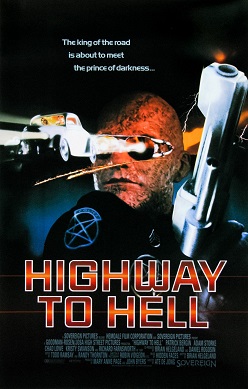
Highway to Hell is a 1992 American B horror comedy film directed by Ate de Jong and starring Chad Lowe, Kristy Swanson and Patrick Bergin. It was written by Brian Helgeland. The film tells the story of Charlie Sykes (Lowe) and his girlfriend Rachel Clark (Swanson), who is kidnapped by a demon and taken to Hell to become one of Satan's brides, while Charlie must travel to the other dimension to rescue her.
Barry England was an English novelist and playwright. He is chiefly known for his 1968 thriller Figures in a Landscape, which was nominated for the inaugural Booker Prize.
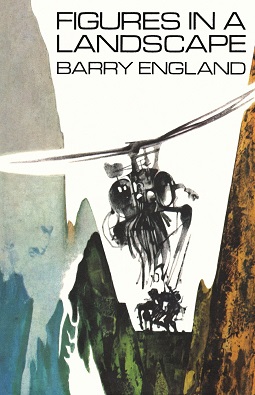
Figures in a Landscape was Barry England's first novel. Published by Jonathan Cape in the summer of 1968, it was hailed by critics as an exemplary addition to the literature of escape. Two professional soldiers, Ansell and MacConnachie, have escaped from a column of POWs in an unnamed country in the tropics. Safety across the border lies 400 miles away; in the meantime, they must make their way through alien territory, battling the climate and the terrain as well as the enemy's soldiers and helicopters. The Times called the book "a fiercely masochistic accomplishment" and concluded another review as follows:
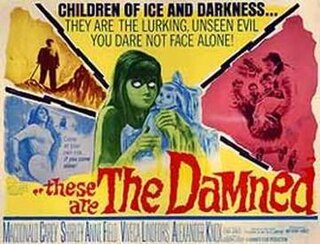
The Damned is a 1961 British science fiction horror film directed by Joseph Losey and starring Macdonald Carey, Shirley Anne Field, Viveca Lindfors and Oliver Reed. Based on H.L. Lawrence's 1960 novel The Children of Light, it was a Hammer Film production.

John James Rambo is a fictional character in the Rambo franchise. He first appeared in the 1972 novel First Blood by David Morrell, but later became more famous as the protagonist of the film series, in which he was played by Sylvester Stallone. The portrayal of the character earned Stallone widespread acclaim and recognition. The character was nominated for American Film Institute's list 100 Years…100 Heroes and Villains. The term "Rambo" is commonly used to describe a lone wolf who is reckless, disregards orders, uses violence to solve all problems, enters dangerous situations alone, and is exceptionally tough, callous, raw and aggressive.

Trucks is a 1997 Canadian-American television horror film directed by Chris Thomson, which follows the story of a group of tourists and locals attacked by autonomous trucks and other inexplicable phenomena in a rural town. It is based on Stephen King's short story "Trucks", which also served as the source material for the earlier film Maximum Overdrive, the only film directed by King. Trucks aired on the USA Network on October 29, 1997.
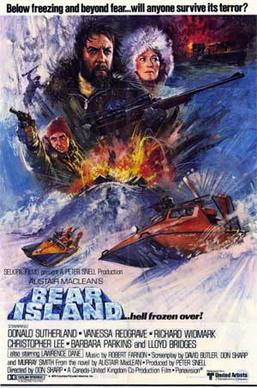
Bear Island is a 1979 thriller film loosely based on the 1971 novel Bear Island by Alistair MacLean. It was directed by Don Sharp and starred Donald Sutherland, Vanessa Redgrave, Richard Widmark, Christopher Lee and Lloyd Bridges.
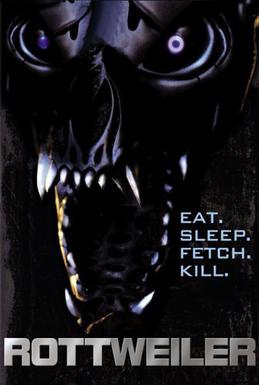
Rottweiler is a 2004 science fiction horror film directed by Brian Yuzna and starring William Miller, Irene Montalà, Paulina Gálvez, and Paul Naschy.

Spy School is a 2008 American comedy-drama film, released outside the United States as Doubting Thomas or Lies and Spies. Although a 2008 release, the movie was actually filmed in Albuquerque, New Mexico, in the summer of 2005. The film stars Forrest Landis, and AnnaSophia Robb as the lead characters. The movie focuses on the adventures of Thomas Miller, in his efforts to save the President's daughter from being kidnapped.

River's End is a 1930 American Pre-Code Western film directed by Michael Curtiz and starring Charles Bickford and Evalyn Knapp. Bickford plays two roles, a Royal Canadian Mounted Police (RCMP) sergeant and the man he is after. The film is the second of three adaptations of the bestselling novel The River's End by James Oliver Curwood, the others being released in 1920 and 1940.
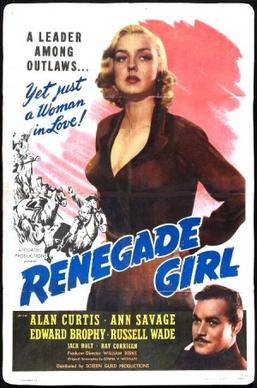
Renegade Girl is a 1946 American western film directed by William Berke and starring Ann Savage, Alan Curtis and Edward Brophy. It was one of a few movies made by the short-lived Affiliated Productions, and was released through Robert L. Lippert's Screen Guild Productions.
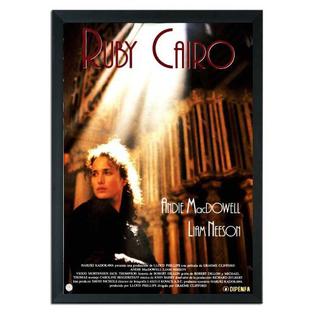
Ruby Cairo, also known as Deception, is a 1992 drama thriller film directed by Graeme Clifford. It stars Andie MacDowell, Liam Neeson and Viggo Mortensen. One scene features Aleister Crowley's The Book of the Law.
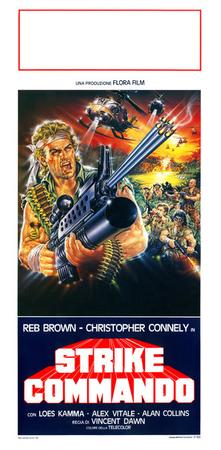
Strike Commando is a 1987 Vietnam war action film directed by Bruno Mattei and starring Reb Brown, Christopher Connelly and Alex Vitale.
The Death of Me Yet is a 1971 television film directed by John Llewellyn Moxey and starring Doug McClure and Darren McGavin. It based on the 1970 novel of the same name by Whit Masterson. The movie appeared on the ABC Movie of the Week on October 26, 1971.
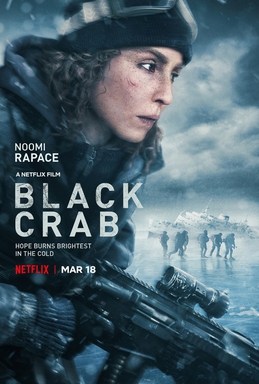
Black Crab is a 2022 Swedish action thriller film directed by Adam Berg. Based on the 2002 novel Svart krabba by Jerker Virdborg, the screenplay was written by Berg and Pelle Rådström. The film stars Noomi Rapace as Caroline Edh, a speed skater who is conscripted to join a team of soldiers for a dangerous mission to skate across sea ice behind enemy lines. The team is tasked with delivering a secret package to an island research base, which they are told could end the war. Jakob Oftebro, Erik Enge, Dar Salim, Ardalan Esmaili, Aliette Opheim, David Dencik, Susan Taslimi, and Stella Marcimain Klintberg appear in supporting roles. The film was released on 18 March 2022 by Netflix.


















